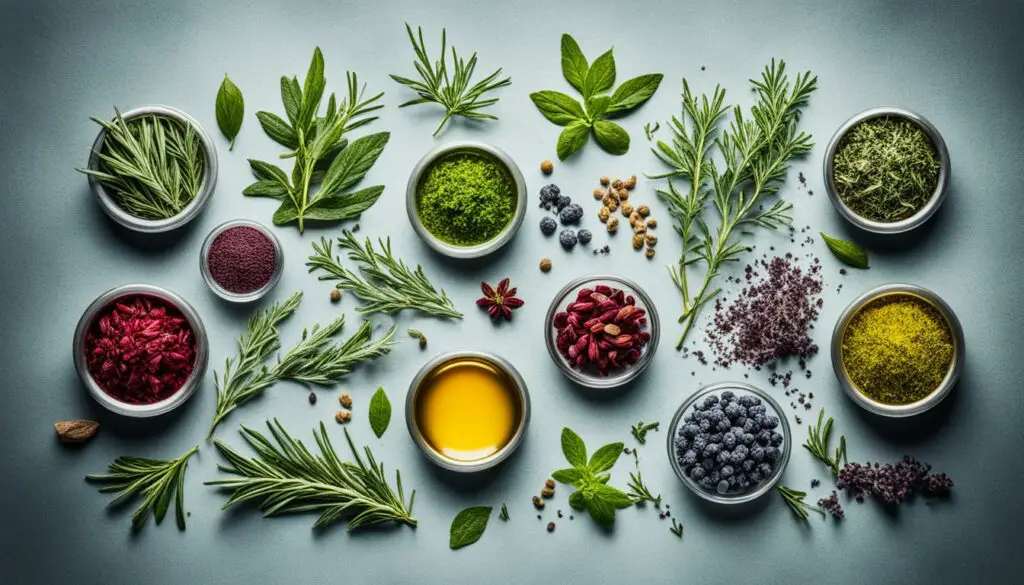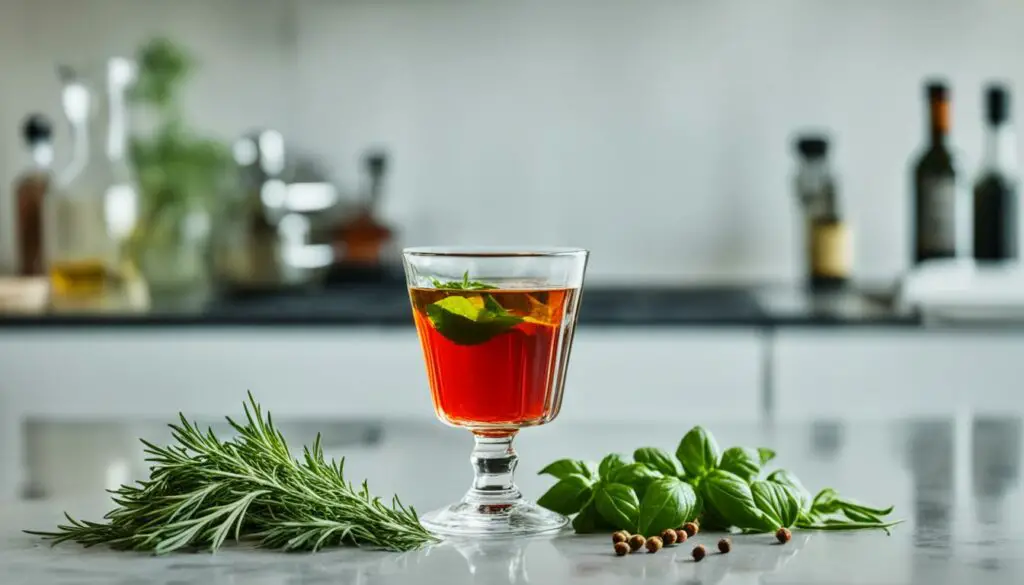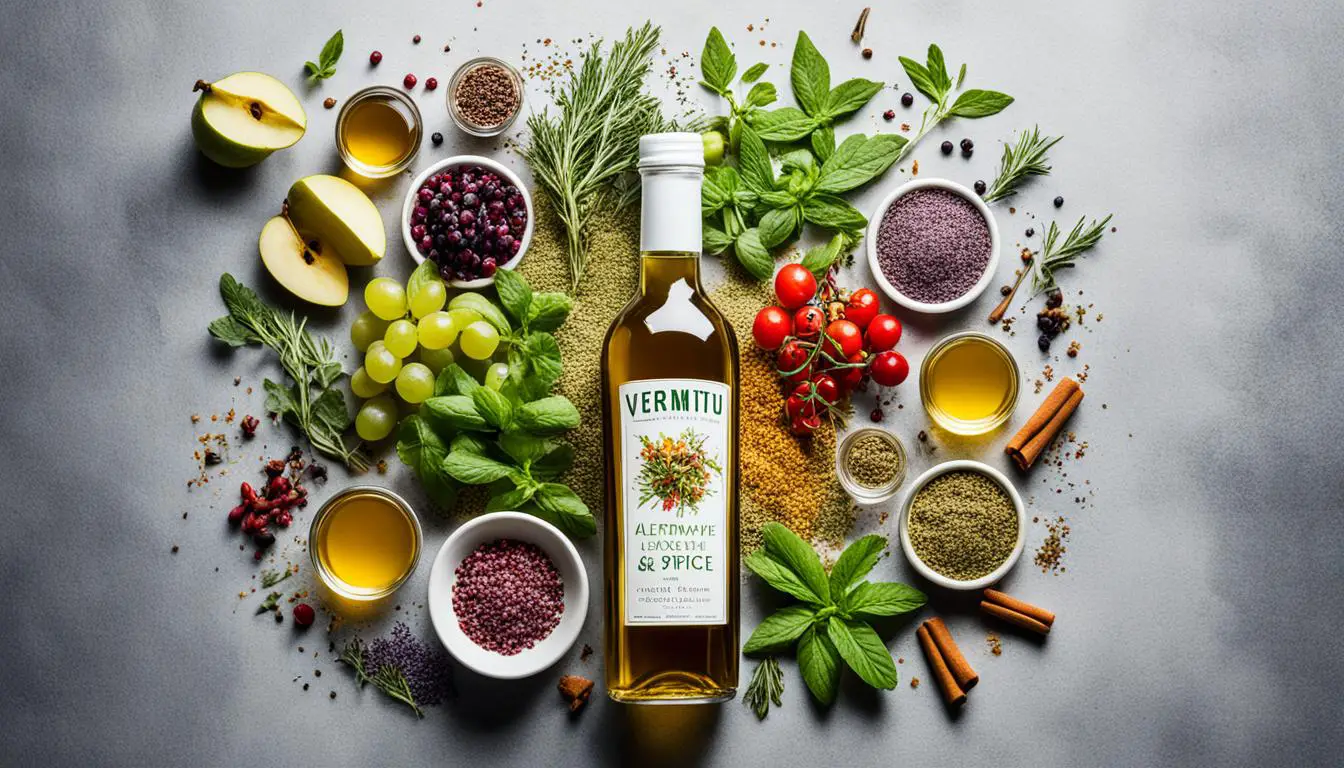Vermouth is a versatile ingredient that adds depth and complexity to many recipes. However, if you find yourself without vermouth in your pantry, don’t fret! There are plenty of substitutes that can be used to achieve similar flavors and results in your dishes. Whether you’re looking to substitute vermouth in cooking or cocktails, we’ve got you covered. Let’s explore some of the best options for replacing vermouth in your favorite recipes.
Contents
- 1 What Is Vermouth?
- 2 Vermouth in Cocktails
- 3 Purpose of Vermouth in Cooking
- 4 Best Dry Vermouth Substitutes for Cooking and Cocktails
- 5 Sweet Vermouth Substitutes for Cocktails
- 6 Dry Vermouth Substitutes for Cocktails
- 7 Conclusion
- 8 FAQ
- 8.1 What can I use as a substitute for vermouth in a recipe?
- 8.2 What is vermouth?
- 8.3 How is vermouth used in cocktails?
- 8.4 What is the purpose of vermouth in cooking?
- 8.5 What are some dry vermouth substitutes for cooking and cocktails?
- 8.6 What are some sweet vermouth substitutes for cocktails?
- 8.7 What are some dry vermouth substitutes for cocktails?
- 9 Source Links
Key Takeaways:
- Substituting vermouth in recipes is possible by using alternative ingredients that offer similar flavors.
- For dry vermouth replacements, consider options like dry white wine, lemon juice, vinegar, Lillet Blanc, or sake.
- When it comes to sweet vermouth substitutes, red wine, Port, Amaro, or Sherry can be excellent alternatives.
- Experiment with these substitutes to find the perfect match for your specific recipes and dishes.
- Now you can confidently create delicious dishes even without having vermouth on hand.
What Is Vermouth?

Vermouth is a fortified wine that has been stabilized with the addition of alcohol. It is commonly used in both cocktails and cooking. There are two main types of vermouth – sweet and dry.
Sweet vermouth is often red in color and has a subtly sweet and spicy flavor. It adds depth and richness to cocktails and is a key ingredient in classics like the Negroni and the Manhattan. In cooking, sweet vermouth lends its complex flavors to dishes like boeuf bourguignon.
Dry vermouth, on the other hand, is usually white and has a crisp, dry flavor. It imparts a subtle bitterness and herbal notes to cocktails, making it an essential component of drinks like the classic Martini. In cooking, dry vermouth is often used to deglaze pans and add a burst of flavor to dishes like veal piccata.
Both types of vermouth bring their unique characteristics to the table and can elevate your cocktails and cooking to new heights. The choice between sweet and dry vermouth depends on the flavor profile you want to achieve and the recipe at hand.
The History of Vermouth
Vermouth has a rich history dating back centuries. It originated in Turin, Italy, in the late 18th century and quickly gained popularity throughout Europe. The recipe for vermouth was perfected by Antonio Benedetto Carpano, who added a secret blend of botanicals to the wine to create the distinct flavors we know today. Since then, vermouth has become a staple in bars and kitchens around the world.
Notable Vermouth Brands
- Cinzano: A well-known Italian brand that offers a range of vermouth options including Bianco, Rosso, and Extra Dry.
- Noilly Prat: Founded in France in the early 19th century, Noilly Prat is renowned for its dry vermouth that lends a unique character to cocktails.
- Martini & Rossi: One of the most famous vermouth brands, Martini & Rossi produces a variety of vermouths that are widely used in cocktails and cooking.
- Carpano: Carpano, the brand that started it all, continues to produce high-quality sweet and dry vermouths that are beloved by mixologists and chefs alike.
With its intriguing flavors and botanical complexity, vermouth adds depth and sophistication to a wide range of recipes. Whether you’re crafting a classic cocktail or adding a splash of flavor to your cooking, vermouth is a versatile ingredient that shouldn’t be overlooked.
Vermouth in Cocktails

Vermouth plays a crucial role in elevating the flavors of classic cocktails like the martini and Manhattan. Its unique characteristics add complexity and depth to these iconic drinks. Dry vermouth introduces a subtle bitterness, while sweet vermouth imparts a rich red color and a hint of caramel. However, if you find yourself without vermouth, fret not! There are vermouth substitutes for cocktails that can deliver similar flavors and aromas.
Vermouth Substitutes for Cocktails
When it comes to substituting vermouth in cocktails, you have several options that can create a comparable experience. Here are some alternatives worth considering:
“Life is too short for uninteresting cocktails.”
– Anonymous-
- Dry white wine: A dry white wine can mimic the flavors of dry vermouth, offering a crisp and refreshing note to your cocktail.
- Lillet Blanc: This French aperitif carries citrusy flavors and herbal notes, making it an excellent substitute for both dry and sweet vermouth.
- Sake: A traditional Japanese rice wine, sake can provide a unique twist to your cocktails as a replacement for dry vermouth.
- Cocchi Americano: With its blend of herbs and spices, Cocchi Americano offers a distinctive alternative with a complex flavor profile, reminiscent of dry vermouth.
These vermouth substitutes provide versatility and can help you craft delicious cocktails even without vermouth. Experiment with different options to find the perfect substitute that complements your desired flavors.
Explore the world of cocktails and unleash your creativity with these vermouth substitutes.
Purpose of Vermouth in Cooking

In addition to cocktails, vermouth plays a significant role in elevating the flavors in cooking. Whether you’re preparing a savory dish or a rich stew, vermouth adds sophistication and depth to your recipes. Dry vermouth, with its distinct herbal notes, is often used in dishes like veal saltimbocca or seafood recipes, imparting a delightful complexity. On the other hand, sweet vermouth, with its subtle sweetness and caramel undertones, is an excellent choice for recipes like boeuf bourguignon.
However, if you find yourself without vermouth in your pantry, there’s no need to worry. There are several alternatives that can provide similar flavors and enhance your dishes. These substitutes allow you to create delicious meals while still achieving the desired taste profiles. Let’s explore some vermouth substitutes for cooking:
| Vermouth Substitute | Flavor Profile | Recommendation |
|---|---|---|
| White Wine | Dry, acidic, and fruity | Use as a 1:1 substitution in recipes calling for dry vermouth. |
| Sherry | Nutty, rich, and slightly sweet | Add depth to your recipes by replacing sweet vermouth with sherry for a similar flavor profile. |
| Apple Cider Vinegar | Tangy and slightly fruity | When needing acidity, use apple cider vinegar sparingly as a substitute for dry vermouth. |
| Balsamic Vinegar | Sweet, rich, and complex | Add a touch of balsamic vinegar when seeking the sweetness and depth of sweet vermouth. |
These vermouth substitutes provide an array of flavors that can enhance your cooking. Experimenting with different alternatives allows you to infuse your dishes with unique taste profiles, making each meal a delightful experience.
Note: When using substitutes, it’s important to adjust the quantities to match the recipe’s intended flavor intensity. Start by using small quantities of the substitute and adjust to taste accordingly.
Best Dry Vermouth Substitutes for Cooking and Cocktails

If you need to substitute dry vermouth in a recipe or cocktail, there are several options to consider. Here are some of the best dry vermouth substitutes that can provide similar flavors and enhance your dishes.
Dry White Wine
Dry white wine is a popular and readily available substitute for dry vermouth. It offers a similar flavor profile and can be used in equal parts as a replacement. Choose a dry white wine with citrusy or herbal notes to mimic the taste of dry vermouth.
Lemon Juice
For a citrusy punch in your cocktails or cooking, lemon juice can be used as a substitute for dry vermouth. It adds a bright and tangy flavor that can complement a variety of dishes. Use it sparingly in recipes to avoid overpowering the other flavors.
Vinegar
If you’re looking for a non-alcoholic alternative, vinegar can be used in cooking as a substitute for dry vermouth. White wine vinegar or Champagne vinegar can provide a similar acidic and slightly fruity flavor. Remember to use it conservatively to prevent the overpowering of other ingredients.
Lillet Blanc
Lillet Blanc is an aperitif wine with citrusy flavors that can be a suitable substitute for dry vermouth. It adds a light sweetness and herbal notes to cocktails and dishes, enhancing the overall taste.
Pernod
Pernod is a licorice-flavored liqueur that can be used as a unique substitute for dry vermouth. Its distinct flavor can add depth and complexity to both cocktails and cooking. Use it in moderation to maintain balance in your recipes.
Experiment with these dry vermouth substitutes to find the perfect option for your cooking and cocktail needs. Whether you choose dry white wine, lemon juice, vinegar, Lillet Blanc, or Pernod, these alternatives can help you achieve a similar flavor profile without compromising on taste.
Sweet Vermouth Substitutes for Cocktails
If you’re looking for substitutes for sweet vermouth in cocktails, there are several options to choose from. Here are some alternatives that can provide similar flavors and enhance your cocktail experience:
- Red wine: Opt for a sweet red wine to achieve flavors and colors similar to sweet vermouth.
- Port: Consider using a dessert red wine like Port as an excellent substitute for sweet vermouth.
- Amaro: Explore the family of Italian-style liqueurs known as Amaro, which can add complexity and sweetness to your cocktails.
- Sherry: Pedro Ximénez or cream Sherries make for interesting substitutes for sweet vermouth, imparting unique flavors to your cocktails.
Experiment with these options to find the perfect substitute for sweet vermouth in your favorite cocktails. Whether you’re crafting a classic or creating your own signature drink, these alternatives can add depth and enhance the overall flavor profile of your cocktails.
Dry Vermouth Substitutes for Cocktails
If you’re in need of a substitute for dry vermouth in cocktails, several options are available. These alternatives can provide similar flavors and enhance your favorite drinks. Here are some dry vermouth substitutes for cocktails:
Dry White Wine
Dry white wine, preferably a dry variety like Sauvignon Blanc or Pinot Grigio, can be a great substitute for dry vermouth in cocktails. It offers similar acidity and flavor profiles, making it an easy swap for recipes that call for dry vermouth.
Lillet Blanc
Lillet Blanc, a French aperitif, is another excellent substitute for dry vermouth. It has a light sweetness and herbal notes that add a unique twist to cocktails. Use it in classics like the Martini or Negroni for a refreshing and flavorful alternative.
Sake
Sake, a Japanese rice wine, can also be used as a replacement for dry vermouth in certain cocktails. It brings subtle flavors and a smooth mouthfeel to drinks. Try using sake in Asian-inspired cocktails or recipes that require a delicate balance of flavors.
Cocchi Americano
Cocchi Americano, an aromatized wine with herbs and spices, offers a unique alternative for dry vermouth. It adds complexity and depth to cocktails, making it a versatile substitute. Experiment with Cocchi Americano in classic cocktails or create your own signature drink.
These dry vermouth substitutes for cocktails ensure you can still enjoy your favorite drinks even without dry vermouth on hand. Each alternative brings its own distinct flavors, expanding your mixology possibilities.
Discover the perfect substitution and elevate your cocktails to new heights!
| Alternative | Flavor Profile | Best Used In |
|---|---|---|
| Dry White Wine | Acidic, light-bodied | Martini, Manhattan |
| Lillet Blanc | Lightly sweet, herbal | French 75, Negroni |
| Sake | Subtle, smooth | Sake Martini, Asian-inspired cocktails |
| Cocchi Americano | Complex, herbaceous | Vesper, Boulevardier |
Conclusion
In conclusion, if you don’t have vermouth on hand, there are plenty of substitutes available for both cooking and cocktails. Whether you’re looking for a substitute for dry vermouth or sweet vermouth, options like white wine, lemon juice, vinegar, Lillet Blanc, red wine, Port, Amaro, Sherry, sake, or Cocchi Americano can help you achieve a similar flavor profile.
Experiment with these alternatives to find the perfect substitute for your recipes. Now you can confidently substitute vermouth in your dishes without compromising on flavor.
FAQ
What can I use as a substitute for vermouth in a recipe?
There are several alternatives you can use as a substitute for vermouth, such as dry white wine, lemon juice, vinegar, Lillet Blanc, red wine, Port, Amaro, Sherry, sake, or Cocchi Americano.
What is vermouth?
Vermouth is a fortified wine that comes in two main types: sweet and dry. Sweet vermouth is red in color with a subtly sweet and spicy flavor, while dry vermouth is white with a crisp, dry flavor.
How is vermouth used in cocktails?
Vermouth is commonly used in classic cocktails like martinis and Manhattans. Dry vermouth adds a subtle bitterness, while sweet vermouth provides color and a hint of caramel.
What is the purpose of vermouth in cooking?
Vermouth is used in cooking to add sophistication and depth to dishes. Dry vermouth is often used in recipes like veal saltimbocca or seafood dishes, while sweet vermouth is used in recipes like boeuf bourguignon.
What are some dry vermouth substitutes for cooking and cocktails?
Dry white wine, lemon juice, vinegar, Lillet Blanc, and Pernod are all excellent substitutes for dry vermouth in cooking and cocktails.
What are some sweet vermouth substitutes for cocktails?
Red wine, Port, Amaro, and Sherry can all be used as substitutes for sweet vermouth in cocktails.
What are some dry vermouth substitutes for cocktails?
Dry white wine, Lillet Blanc, Sake, and Cocchi Americano can all be used as substitutes for dry vermouth in cocktails.









